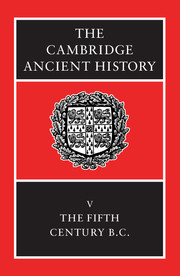Book contents
- Frontmatter
- Contents
- List of maps
- List of text-figures
- Preface
- 1 Sources, chronology, method
- 2 Greece after the Persian Wars
- 3 The Delian League to 449 b. c.
- 4 The Athenian revolution
- 5 Mainland Greece, 479–451 b. c.
- 6 The Thirty Years' Peace
- 7 Sicily, 478-431 b.c.
- 8 Greek culture, religion and society in the fifth century b.c.
- 9 The Archidamian War
- 10 The Peace of Nicias and the Sicilian Expedition
- 11 The Spartan Resurgence
- Chronological Notes
- Chronological Table
- BIBLIOGRAPHY
- Index
- 1 Greece and Western Asia Minor
- References
6 - The Thirty Years' Peace
Published online by Cambridge University Press: 28 March 2008
- Frontmatter
- Contents
- List of maps
- List of text-figures
- Preface
- 1 Sources, chronology, method
- 2 Greece after the Persian Wars
- 3 The Delian League to 449 b. c.
- 4 The Athenian revolution
- 5 Mainland Greece, 479–451 b. c.
- 6 The Thirty Years' Peace
- 7 Sicily, 478-431 b.c.
- 8 Greek culture, religion and society in the fifth century b.c.
- 9 The Archidamian War
- 10 The Peace of Nicias and the Sicilian Expedition
- 11 The Spartan Resurgence
- Chronological Notes
- Chronological Table
- BIBLIOGRAPHY
- Index
- 1 Greece and Western Asia Minor
- References
Summary
THE PEACE OF CALLIAS
Thucydides' account of the Fifty Years contains no statement of any kind about a cessation of hostilities between Athens and Persia. That is, by any standards, a serious omission of a matter directly relevant to the development of the empire (cf. Thuc. III. 10.4): it is the nature and completeness of his excursus which should be questioned rather than the fact that the Persian War came to an end. It is clear that Athens abstained from further offensive action against Persia after Cimon's last expedition. Nothing in Book 1 of Thucydides suggests that Athens was known to be in a state of war with Persia in the 430s, and in the early years of the Peloponnesian War Athens appears to be feeling for Persian help without any suggestion that peace itself was an issue.
The only sources which fill the gap with any clarity are derived from Ephorus. Of these, Aristodemus 13 may be safely neglected. In Diodorus (XII.4) the King is moved by the defeats in Cyprus to desire peace. A mission to Athens from the Persian commanders is followed by an Athenian embassy headed by Callias son of Hipponicus and by a settlement. The terms reported are that all the Greek cities of Asia should be autonomous, that the Persian satraps should not come within three days' journey of the sea, that no long ships should come beyond Phaselis and the Blue Rocks, and that the Athenians should not attack the King's territory (chora).
Keywords
- Type
- Chapter
- Information
- The Cambridge Ancient History , pp. 121 - 146Publisher: Cambridge University PressPrint publication year: 1992
References
- 7
- Cited by

